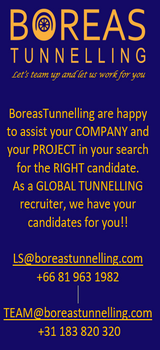Gotthard Tunnel chooses Herrenknecht TBMs also for the construction of the second tube
Mechanized tunnelling technology from Schwanau is once again being used at the St. Gotthard in Switzerland. Herrenknecht engineers presented a tunnel boring machine for driving the second tube of the Gotthard road tunnel on July 30, 2024. A high-ranking delegation from the construction company Marti Tunnel AG and the client, the Swiss Federal Roads Office (ASTRA), was present.
August 8, 2024, Schwanau, Germany Around 16,000 vehicles pass through the Gotthard road tunnel every day. That's six million cars and trucks per year. For 45 years, it has been a key structure for European north-south traffic through the Alps. It runs for 16.9 kilometers between Göschenen in the Swiss canton of Uri and Airolo in the canton of Ticino. The Swiss Federal Roads Office (ASTRA) is tackling the necessary age-related repairs after long-term and careful planning. ASTRA has commissioned the construction of a second, parallel tube to ensure that traffic can continue to flow during the renovation and the necessary closure of the tunnel. Once all the work on both tubes has been completed, one tunnel with one lane (plus emergency lane) will be available for southbound and one for northbound traffic – a significant improvement in safety compared to the previous operation with two-way traffic in one tube.
Specialist for the rock of the Alps
The companies commissioned with the tunnel excavation ordered one tunnel boring machine (TBM) for the northern and one for the southern construction section of the main tunnel. The representatives of the construction company Marti Tunnel AG together with the responsible Herrenknecht engineers successfully completed the technical acceptance of the machine for the southern construction section on July 30, 2024: The diameter of the Single Shield TBM is 12,310 millimeters. The cutterhead is driven by 16 electric motors, which have a total output of 5,600 kilowatts or around 7,600 hp – a current Formula 1 car has around 1,000 hp. As a Single Shield TBM, the machine is a specialist for driving through the hard rock of the Alps. Granite, gneiss and slate are the main types of rock to be expected on the 7,755 meter long southern tunnelling section. Following technical acceptance, the machine will now be dismantled and the components transported to the construction site in Airolo (Ticino). There, the TBM will be reassembled so that the miners from Marti Tunnel AG can start driving the main tunnel from the south as planned from March 2025.
Fault-free to the fault zones
According to preliminary geological investigations, the tunnel builders expect a geological fault zone in both the north and south of the planned route for the main tunnel. Due to the rock characteristics, the decision was made to excavate the two fault zone sections using conventional blasting before starting the mechanized main tunnel drive. In order to reach the fault zones in the mountain, access tunnels were driven through the rock. For the access tunnels, mechanized tunnelling technology was also used. Marti Tunnel AG successfully completed the excavation of the southern access tunnel with a Herrenknecht Single Shield TBM (Ø 7,400mm) in August 2023. The machines for the main tunnel will later be pulled through the two fault zones that have already been excavated.
Herrenknecht supplied a Gripper TBM (Ø 7,030mm) and a Single Shield TBM (Ø 12,225mm) to a consortium of the companies Implenia Schweiz AG and Frutiger AG for the two northern construction lots (main tunnel and access tunnel). The excavation of the northern access tunnel was completed in April 2023. Acceptance of the Single Shield TBM for the southern section of the main tunnel took place in Schwanau on July 8, 2024.
The Champions League of tunnel construction
Construction consortia used four Herrenknecht machines at the Gotthard from 2003 to 2011 to excavate a total of 85 kilometers of tunnel for the world's longest railway tunnel to date. The delivery for the Gotthard Base Tunnel is one of the outstanding milestones in Herrenknecht's company history. This is also confirmed by Matthias Schwärzel, responsible head of project management. He is proud to be returning to the Gotthard with Herrenknecht technology: "Tunnel construction in the Alps and especially on the Swiss St. Gotthard always has an emotional component for us. We are looking forward to working with the miners on the construction site."
PROJECT DATA SECOND GOTTHARD ROAD TUNNEL TUBE
Client: Swiss Federal Roads Office ASTRA
Application: Road
Geology: Granite, gneiss, slate
LOTS 343 AND 341 (SOUTH)
Contractor: Marti Tunnel AG
Tunnelling length: 5,000m (access tunnel) + 7,755m (main tunnel)
MACHINE DATA
Machine type: Single Shield TBM
- Diameter: 7,400mm
- Cutterhead drive power: 2,800kW
- Torque: 4,375kNm
Machine type: Single Shield TBM
- Diameter: 12,310mm
- Cutterhead drive power: 5,600kW
- Torque: 28,552kNm
LOTS 243 AND 241 (NORTH)
Contractor: ARGE secondo tubo (Implenia Schweiz AG, Frutiger AG; Los 243 with Webuild SA and CSC construzioni SA)
Tunnelling length: 3,940m (access tunnel) + 6,885m (main tunnel)
MACHINE DATA
Machine type: Gripper TBM
- Diameter: 7,030mm
- Cutterhead drive power: 2,800kW
- Torque: 4,408kNm
Machine type: Single Shield TBM
- Diameter: 12,225mm
- Cutterhead drive power: 5,250kW
- Torque: 26,767kNm
source: Herrenknecht.
cover tunnel photo by: Matt Brown from London, England / CC BY
Copyright 2019-2024 TunnelContact.com








I wonder if they had considered other TBM manufacturers in their evaluations (that is, if there were any) or they just decided to spend taxpayers' money on a specific brand?